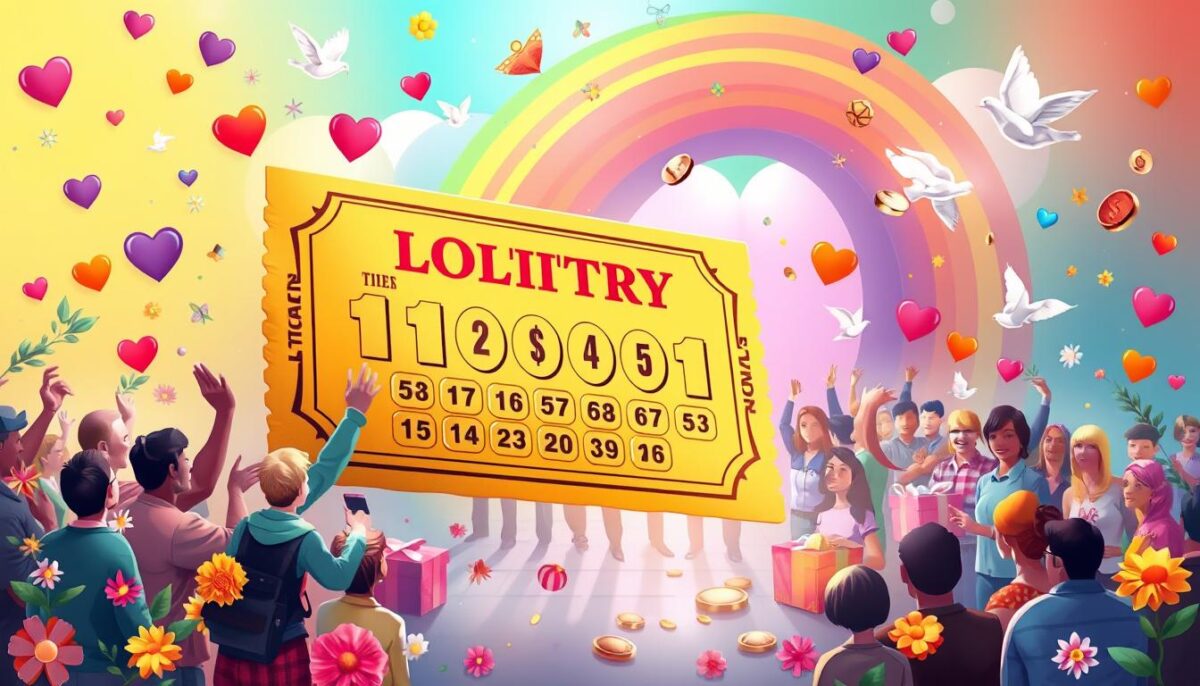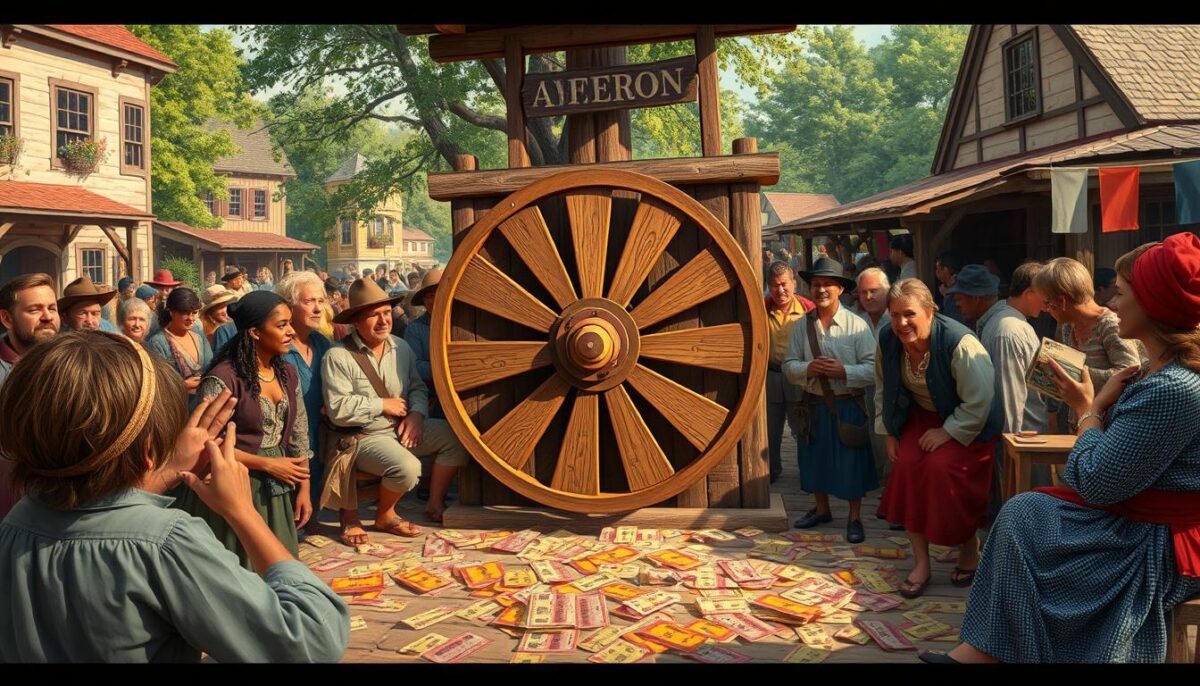We believe lotteries can greatly help in giving back to the community. At DEWAKOIN, we aim to offer a safe, fun, and rewarding online gaming experience. This experience supports good causes. Lotteries play a big role in helping out, from funding important programs to helping local communities.
The Arizona Lottery has given over $5.6 billion to different programs since it started. This shows how lotteries can make a big difference, helping both lotteries and philanthropy.
We will look into how lotteries help in giving back. We’ll see how they have evolved over time and their current impact. We’ll also talk about how they help local businesses, create jobs, and fund important causes like scholarships and medical research.
Key Takeaways
- Lotteries can drive philanthropy and community development, supporting lotteries and philanthropy.
- The Arizona Lottery has contributed over $5.6 billion to various programs since its inception, demonstrating the impact of lotteries on philanthropy.
- Lottery winnings can lead to increased spending in local businesses, contributing to job creation and economic growth, and promoting lotteries.
- Philanthropic efforts by lottery winners can lead to funding for scholarships, food banks, and medical research, significantly improving community resources and supporting philanthropy.
- At DEWAKOIN, we’re committed to providing a secure, enjoyable, and rewarding online gaming experience that supports good causes, and promotes lotteries and philanthropy.
- Lotteries can support local initiatives aimed at empowering vulnerable populations and preserving natural landscapes, driving philanthropy and community development.
- Lotteries have a multifaceted impact on philanthropy, from funding vital programs to empowering local communities, and promoting lotteries.
The Historical Evolution of Lottery-Based Fundraising
Lotteries have greatly impacted community development and fundraising. The idea of using lotteries for good dates back to ancient times. Over time, we’ve seen how lotteries can boost philanthropy and help communities grow.
The Arizona Lottery is a great example of how lotteries can make a difference. Since 1981, it has funded important programs and initiatives, not just for winners.
Ancient Origins of Charitable Lotteries
Lotteries for good causes have a long history. They go back to ancient times. This early use set the stage for today’s lotteries.
Notable Historical Examples
Many examples show the power of lotteries for fundraising. For instance, the McKinley National Memorial Association raised over $500,000 in 1907. These stories highlight how lotteries can help communities and raise funds.
Some key stats on lotteries’ impact include:
- The Princess Margaret Home Lottery has raised over $1 billion for cancer research since 1996.
- The biggest 50/50 jackpot was $10 million.
- It’s the biggest source of funding for medical research in Canada.
Understanding the Connection Between Gaming and Giving
The link between gaming and giving is complex and deep. Many gamers also like to help others, and the lottery supports good causes. A study shows that 25% of lottery winners give to public services and projects.
The National Lottery has given £50 billion to good causes in the UK. This shows the big role lotteries play in giving. They have helped 290,000 projects, touching over 5 million lives at once. Lotteries are a big part of helping others, and we support them doing it right.
- £50 billion raised for good causes by the National Lottery
- 290,000 projects supported by National Lottery funding
- 5 million people benefiting from National Lottery-funded projects at any given time
We think gaming and giving go hand in hand. We aim to boost charitable giving and ensure gaming is done responsibly.
Modern Lottery Systems and Their Philanthropic Impact
Modern lottery systems are key in driving philanthropy and community growth. They have changed to include many initiatives. These range from state-run programs to private efforts and digital platforms.
The Arizona Lottery has given over $5.6 billion to support education, health, and more. This shows how lotteries can greatly help society and support good causes.
State-Run Lottery Programs
State-run lotteries are a big part of modern systems. They bring in a lot of money for things like schools, roads, and public services. These programs aim to help society and grow communities.
Private Sector Initiatives
Private efforts are also vital in modern lotteries. Many companies use lotteries to raise money for charities. This way, they help society and support community growth.
Digital Platform Contributions
Digital platforms are another key part of modern lotteries. They make it easy for people to play and help good causes. These platforms help support society and community growth.
Modern lottery systems positively impact communities worldwide. They support social responsibility and promote gaming for good. We aim to offer a safe, fun, and rewarding online gaming experience. We also want to help society and support community growth.
The Mathematics of Social Impact: How Lottery Funds Support Communities
We think lottery funds can really help communities. They drive philanthropy and community development. By looking at how lottery funds help, we learn more about their positive effects.
The Arizona Lottery is a great example. It has funded scholarships, improved public transit, and helped wildlife. This shows how lottery funds can make a big difference in Arizona.
Lottery funds support communities in many ways. They fund education, support projects, and help those in need.
- Funding public education and social programs
- Supporting community development projects
- Providing financial assistance to those in need
Understanding the math behind social impact shows lotteries’ role in helping. We aim to offer a safe, fun, and rewarding online gaming experience. We also want to help our communities.
| Lottery Funds Allocation | Percentage |
|---|---|
| Public Education | 60% |
| Community Development | 20% |
| Other Programs | 20% |
Lotteries and Their Transformative Role in Philanthropy: Case Studies
Lotteries have a big impact on helping others. They help fund education and healthcare. This shows how they can change lives for the better.
The Arizona Lottery’s Gives Back program is a great example. It has given over $2.8 million to local groups in six years. This fundraising has helped many causes in the community.
LottoLove is another example. It uses scratch-off tickets to help charities. This way, more people can help out and feel happy doing it.
These examples show how lotteries can help. They can make a big difference in our world. Lotteries and philanthropy together can change lives for the better.
| Lottery Program | Funds Raised | Impact |
|---|---|---|
| Aizona Lottery’s Gives Back | $2.8 million | Supported local nonprofits |
| LottoLove | Increased accessibility and joy in philanthropy | Supported charitable giving |
Digital Innovation in Charitable Gaming
We’re seeing big changes in how we play for charity, thanks to digital innovation. Now, more people can join in and help good causes. The lottery industry is growing fast, expected to hit over $500 billion by 2035.
Blockchain technology is leading this change. It makes games fairer and more transparent. Blockchain’s potential to reduce risks of fraud is a big plus. Smart contracts in blockchain lotteries also help stop cheating, as they’re open to everyone to check.
Key Benefits of Digital Innovation
- Increased accessibility and transparency
- Enhanced security and fairness through blockchain technology
- Improved player engagement through digital technologies such as smartphone apps and interactive terminals
As we dive deeper into digital innovation in charitable gaming, we’ll see how tech supports good causes. We’ll look at how these new tools can make a big difference worldwide. By focusing on charitable giving and social responsibility, we can build a better future for everyone.

Ethical Considerations and Responsible Gaming Practices
We understand the value of playing games responsibly in the lottery world. We aim to support gaming for good and philanthropy. It’s crucial to focus on ethical and responsible gaming as the industry grows.
The Arizona Lottery shows us how to handle gaming responsibly. They support problem gamblers and promote safe play. We can learn from them to make gaming better for everyone.
Here are some ways to play games responsibly:
- Helping those who gamble too much
- Keeping games out of kids’ hands
- Teaching players to play wisely and set limits
Together, we can make a difference in our communities. We’re dedicated to being a responsible gaming partner. We’re excited to keep working towards safer and more enjoyable gaming for all.
Future Trends in Philanthropic Gaming
We’re excited about the future of philanthropic gaming. It has huge potential for helping communities and raising funds. New technologies like blockchain and artificial intelligence will be key players in this area.
Here are some trends we think will shape the future of philanthropic gaming:
- Increased use of blockchain technology to enhance transparency and security
- Integration of artificial intelligence to improve user experience and predict user behavior
- Development of social impact gaming models that prioritize community development and fundraising
These trends will make gaming better and help grow community and fundraising efforts. As we keep exploring and innovating, we’re sure philanthropic gaming will become a big force for good.

By using these trends and technologies, we can make philanthropic gaming more lasting and effective. It will help both gamers and communities. We’re dedicated to leading this movement and can’t wait to see the good it will do.
| Trend | Description |
|---|---|
| Blockchain Technology | Enhances transparency and security in philanthropic gaming |
| Artificial Intelligence | Improves user experience and predicts user behavior |
| Social Impact Gaming Models | Prioritizes community development and fundraising |
Conclusion: The Lasting Impact of Lottery-Based Philanthropy
The impact of lottery-based philanthropy is huge. Lotteries fund education and community projects, making a big difference. They will keep helping charities and making a lasting change.
The People’s Postcode Lottery in the UK has raised over £291 million for charities. The Arizona Lottery has also made a big difference in the state. These stories show how lotteries can really help.
Lotteries can do more good by focusing on responsible gaming and digital innovation. They use new tech like blockchain and mobile-first platforms. This helps them reach more people and make a bigger impact.
We’re looking forward to seeing more from lottery-based philanthropy. Together, we can make the lottery more than just fun. It can be a force for good, helping communities and changing lives.
FAQ
What is the mission of DEWAKOIN?
DEWAKOIN aims to offer a safe, fun, and rewarding online gaming experience. We provide the latest and most exciting slot games. Our goal is to ensure every player has a fair and thrilling time.
How do lotteries drive philanthropy and community development?
Lotteries have long supported good causes, funding vital programs and empowering communities. Many gamers are also inclined to give back. Today, lotteries support a wide range of philanthropic initiatives, making a big difference in communities.
What is the historical evolution of lottery-based fundraising?
Using lotteries for charity goes back to ancient times. The Arizona Lottery is a notable example of their impact. Over time, lotteries have become a key way to fund important initiatives and support communities.
How do modern lottery systems impact philanthropy?
Modern lotteries support many philanthropic efforts, from state programs to private initiatives and digital platforms. These efforts show the big role lotteries play in driving philanthropy and community development.
What is the role of lotteries in supporting communities?
Lottery funds support education, healthcare, and community projects. By looking at how lottery funds are used, we see their impact on communities. This shows the power of lotteries in making a difference.
What are the ethical considerations and responsible gaming practices in the lottery industry?
As the lottery industry grows, ethics and responsible gaming are key. It’s important to promote safe gaming, help problem gamblers, and ensure transparency and accountability.
What are the future trends in philanthropic gaming?
The future of gaming for good is bright, with new technologies and social impact models. These trends will help the lottery industry continue to make a difference worldwide.

